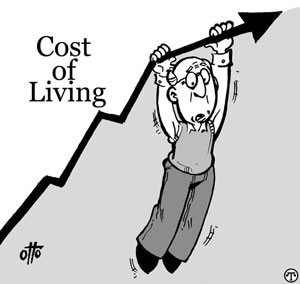Inflation, Climate Change and more
Job Board + Inflation + GDP Loss + UK PM's Visit
Hello, hope you are having a great Sunday. This week we reflect on the recorded inflation in India & IMF’s suggestions to combat it, along with the challenges of climate change and its impact on the global economy.
Top Jobs of the Week-
Research Coordinator - Growth and Partnerships, Educational Initiatives, Location-Mumbai, Mode- On-site, To apply, click here
Programme Officer, The Nature Conservancy, Location- Delhi, To apply click here
Mental Health Program Manager, WAMH Foundation, Location- Mumbai, Mode- Remote, To apply, click here
With a slide in growth estimates, India finds itself in a tough spot
The World Bank recently slashed the growth estimate for India from 8.7% to 8% for the year 2022-23 as the country experiences a spike in the cost of living. Here, we analyse the reasons and the plan of action suggested by the International Monetary Fund.
The reasons fueling the inflation-
Disruption in Supply chain- The ongoing military operation in Ukraine disrupted the global supply chain which subsequently led to the rise in prices of crude oil and other commodities.
Ministry of Commerce and Industry in its statement shared that the high rate of inflation is primarily due to the increased prices of crude
petroleum and natural gas, mineral oils, basic metals, etc.
Spurt in Food prices- The food price rise has been fuelling inflation in India in recent months. This has been sharply felt by millions living below the poverty line who have already taken a hit on jobs and incomes due to the pandemic.
COVID acting as a deterrent- China introduced lockdown measures in its two major cities, Beijing and Shanghai amidst growing cases of Covid. These two cities are the power engines of China’s economy. Globally, the economies are still working their way out of the past pandemic shocks. This is likely to disrupt the domestic demand for essential commodities and the closing of operations at key Chinese ports will further push up container shipping costs that are already high.
Monetary Tightening
To remain enveloped from the impact of soaring prices, the International Monetary Fund (IMF) has suggested the Government of India adopt the policy of monetary tightening.
Monetary tightening means, bringing a change in monetary policy to minimize or slow down inflation, a central bank could make it more expensive for consumers to spend money and businesses to borrow money by raising interest rates. This is a form of contractionary monetary policy—it restricts, or contracts, spending.
The IMF officials emphasised the importance of focusing on infrastructural investment, supporting vulnerable households and commodity fiscal stance to escape from the impact of rising crude oil prices and inflation in general.
(Sources: Mint, India Today, Tribune, Print)
Climate change is challenging the global economic outlook
Time and again, the think tanks, institutes and international organisations have brought to light the reports and studies highlighting how climate change is impacting the global economy. Here, we analyse the two reports published recently, which bring in light the economic impact and how different would it be continent and region wise.
The new study-
S&P Global ( a firm which gives countries credit scores based on the health of their economies) published a new study of 135 countries, revealing:
By 2050, 4 per cent of global annual economic output would be lost due to climate change. The poorer parts of the world would be affected by it disproportionately.
How will each region get impacted?
The International Labour Organisation projected with an increase in global temperature by 1.5 the global economy will lose US$2,400 billion.
The study by S&P Global further highlights the varied impacts on the lower and middle-income countries. These countries are at more risk of losing 10-18% of GDP because of the geopolitical location and lost working hours.
The countries near the equator and the tiny islands are comparatively more vulnerable than the rest of the world. The reason being most of them rely on agriculture which is more likely to be harmed than the ones relying on other sectors as well.
The Future impact in figures- Swiss re Institute analysed
To measure the impact of climate change in figures, the Swiss Re Institute conducted a stress test to analyse 48 economies under four different scenarios of increasing temperatures.
The global GDP loss by 2050 under different degrees:
18% if no mitigating actions are taken (3.2°C increase)
14% if some mitigating actions are taken (2.6°C increase)
11% if further mitigating actions are taken (2°C increase)
4% if Paris Agreement targets are met (below 2°C increase)
Experts view & the plan of action-
Jérôme Haegeli, Swiss Re’s Group Chief Economist, said:
Climate change is a systemic risk and can only be addressed globally. So far, too little is being done. Transparency and disclosure of embedded net-zero efforts by governments and the private sector alike are crucial. Only if public and private sectors pull together will the transition to a low-carbon economy be possible. Global cooperation to facilitate financial flows to vulnerable economies is essential. We have an opportunity to correct the course now and construct a world that will be greener, more sustainable and more resilient.
(Sources: Reuters, Financial Review, Swiss Re, International Labour Organisation)
Boris Johnson’s Visit to India
India and the United Kingdom, after their 2021 virtual meet and the Brexit in 2020, are all set to transform trade, defence and security cooperation in the 2022 visit's agenda. Tap on the button below to read more about it.
If you found our newsletter meaningful, please share it with your network. We believe word-of-mouth is the way to grow and we look forward to your support.








